Michael Gabriele's Blog
November 18, 2019
The Jesus Ratio: 100% God and 100% Human

It’s simple math. You can’t add 100% to 100% and get 100%.
You cannot have someone who is 100% Irish and 100% Italian. You can’t mix a drink with 100% gin and 100% tonic. You can’t be 100% for one team and 100% for another. 100% can only be reached with lesser percentages that add up to it.
This elementary arithmetic is why the identity of Jesus is so hard for us to grasp at times. During His 33-year life among us, Jesus was 100% God … and 100% human. He wasn’t 50% God and 50% human. He wasn’t 80% God and 20% human. He wasn’t 30% God and 70% human. Somehow, we must comprehend the reality that our Lord maintained 100% of His divinity, while at the same time committed to become 100% like us—human in every way. In other words, He was a Savior who walked upon the water, yet collapsed under the weight of the cross. And that’s where the conundrum lies—that we have a God powerful enough to create the universe and everything in it, and also a God who agreed to experience every aspect of human fear, pain, loss, tiredness, sickness, etc.
Although the math doesn’t add up when it comes to Jesus’ divinity/humanity ratio, His being 100% of both enables us to look to Him more easily on how to conduct our lives. Could I really turn to Jesus for strength during difficult times if He had simply manifested Himself in a human-like form, but never actually felt as angry or upset as I do? … if He never felt as frustrated and lost as I sometimes feel? … if he never felt afraid of the future? … of death? … or if He was never tempted the way I am to sin?
It is indeed difficult to understand that Jesus, whose body and blood were mysteriously divine, was someone who experienced real anger, just never let it escalate into hatred. He experienced unparalleled panic and fear, just never let it control Him or diminish trust in His Father. He experienced the same urges and temptations that we all do, just never gave into them. That’s where His full divinity came into play—to never succumb to all the rot the devil threw at Him—the same rot the evil one throws at us each day.
Worshiping a 100%-God who was also a 100%-human, gives us hope. It gives the world that is strictly 100%-human and 0%-God, a light to focus on.
So … try forgetting the math and simply focus on the wonderful truth—that Jesus is not either our God or our brother, he is both our God and our brother!
July 26, 2019
Jesus was king of the mic drop

We all love a great “mic drop” moment. That perfect occasion when
somebody’s verbal comeback stuns his or her opponent to silence. That calm,
cool, “enough said—boom” situation. Let’s face it, we all experience
satisfaction when a cleverly crafted, succinctly-put answer or statement knocks
someone off their high horse. It easily beats the delight of any physical
domination.
And let’s be clear, Jesus was the end-all-be-all king of the “mic
drop.” No one has ever transformed their duplicitous challengers into
speechless buffoons better than our Lord. Can you imagine the glassy-eyed
stares on those who found themselves on the business end of these priceless
conversation-enders? And these are just a small handful of Jesus’ best.
To those
probing whether taxes should be paid: “Give to Caesar what is
Caesar’s. Give to God what is God’s.”
To those
always condemning the actions of others: “Take the log out of your own
eye, so you can better see the speck in your brother’s eye.”
To those
claiming He had no authority to forgive the sins of a cripple: “Which is easier, to say your
sins are forgiven, or to say, ‘Go, pick up your stretcher and walk.’?”
To those
inquiring whether we should actually forgive somebody seven times: “No. Not seven times. Seventy
times seven times.”
To those
challenging whether it was lawful to heal somebody on the Sabbath: “Who wouldn’t help an ox if it
fell into a ditch on the Sabbath?”
To those
asking if a woman caught committing adultery should be stoned: “Whoever is without sin, should
cast the first stone.”
To those
demanding a sign that would justify His actions: “Destroy this temple, and in
three days I will rebuild it.” A great foreshadowing mic drop at
that!
There are
countless others, but probably the most poignant, shocking statement Jesus
made, one that must have sent chills up the necks of those He spoke it about,
was what He said while the soldiers were nailing him to a beam. “Father forgive them, for they
know not what they do.”
Those words
echo in our heads even today. Can you imagine how they echoed in the heads of
those who heard it?
March 29, 2019
What did Jesus think as the sun went down that fateful Thursday evening?
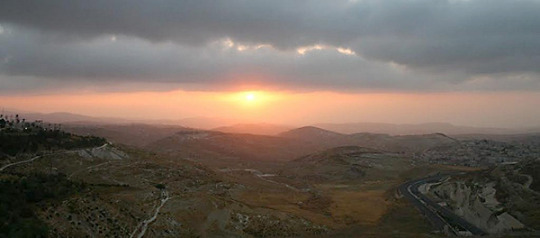
We’ve all been there before … Worry. Dread. Panic. Loneliness.
We are not alone. God Himself knows these feelings all too well. Can we even imagine what Jesus may have been thinking and grappling with as the sun went down on the eve of Good Friday?
An excerpt from In The Flesh – My Story may help us contemplate:
Dusk descended on Jerusalem. Shadows from the western wall stretched farther over the city as the sun sank deeper behind the horizon. It was a blood-red sunset, painting the heavens afire. From the roof of the building where I was to eat dinner with my apostles, I watched the radiance slowly fade with the darkening sky. The day was coming to a close. My final evening was here, as were the final hours of the Mosaic testament between God and man. Tomorrow at this time, a new covenant would be sealed in flesh and blood. My flesh and blood.
The sun was so low now—just a crescent on the crest of that western wall—I could gaze directly upon it. I felt like a man kneeling in a barren, lifeless desert thirsting for his last drops of water, watching them dissolve into the sand. Imminent death beckoned. Darkness engulfed the sky and consumed my heart. My greatest act of love was all that remained. My teaching and healing were complete. My mission to spread the good news of God’s love had been delivered. It was now time to authenticate that message with indisputable validation. For my brothers and sisters—for the human race that I cared so much for and chose to become one with—I now chose to be broken for them. I was prepared to take the weight of their sins upon my back—to endure their punishment for them.
This steadfast, absolute love is all that kept me from shaking as the sun went down.
I love you.
So much so, I discard my power and submit completely to the torments of evil to unequivocally demonstrate that love. My love for you is so infinite and so boundless, I consent to do on earth what I could not do from heaven … die for you. I came in the flesh so that I could offer my flesh in death for you.
There is no greater love than this.
December 17, 2018
Simply the best Christmas verse.
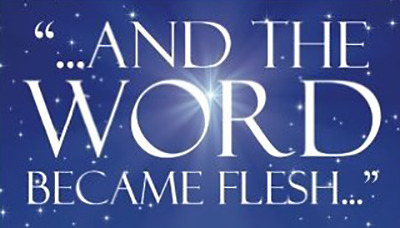
When looking for that one, perfect Scripture passage to focus on for Christmas, most people usually settle upon one of the nativity stories from Matthew or Luke’s Gospel. We all love Linus’ wonderfully prolonged soliloquy in the “Charlie Brown” Christmas special as he recites the angel’s announcement to the shepherds about the birth of Jesus in Bethlehem.
But it’s certainly not practical for us to memorize the first two chapters of Matthew or Luke so that we can reflect upon the true meaning of Christmas while we’re in the car, waiting in line somewhere, or scarfing down a quick lunch at our desks. But there happens to be, from the first Chapter of John, a very short, single-sentence passage that describes quite succinctly, all the wonder, awe, joy and comfort that is Christmas.
And the Word became flesh and dwelt among us.
There it is—a mere fragment of a verse—a thought so simple and concise we can memorize it in a moment or two. A truth so easy to remember, we can bring it to mind at any time, whether we are baking cookies or burying a loved one.
God didn’t just come to us in Spirit. He actually put on our flesh and humbled Himself to become as delicate and vulnerable as we are—to endure every trial and tragedy that we endure—to accomplish on earth the one and only thing he was not capable of accomplishing in heaven—dying for us.
The magnificent message of Christmas is that God—the creator of the entire universe—loves us so much, even in our most sinful nature, that he put the comforts of heaven aside and put the protection of omnipotence on hold. Instead of reaching down to us, He came down to us. God became human. The very Word of God became flesh so that he could dwell among us … to teach us … to laugh and cry with us … to heal us … to be crucified and die for us … and to conquer death for us by rising to eternal life.
And the Word became flesh and dwelt among us.
If you stop and try to fathom that reality for a few seconds … how can you not rejoice?
September 6, 2018
Jesus needed some alone time—so do we
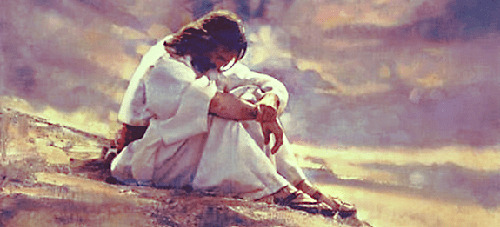
Hardly anyone would ever suggest that Jesus was anti-social. He sought people out, asked strangers to follow him, allowed crowds by the thousands to surround and touch him; he even requested to dine in many of their houses. He was, without a doubt, a people-person.
But not always.
Although truly the incarnation of God, Jesus was human in every way. All the things that irk and wear us out, irked and wore him out too. People frustrate us. They frustrated Jesus too. Long days make us weary and on-edge. They also made Jesus weary and on-edge. Large groups tend to agitate us and make us feel claustrophobic. Jesus felt smothered, cramped and consumed on countless occasions as crowd after crowd tracked him down—to the point where he repeatedly had to run and hide—escaping to the hills, the woods, even into small boats to smuggle himself undetected out onto the Sea of Galilee.
While there were no “WTF” acronyms back in first-century Palestine, you can bet our Lord experienced reaching the end of his rope at times. He needed a break … and took them often.
So take a break.
Get away from people—even friends and family for a little while. Withdraw like Jesus did to a place no one will find you. He utilized those times to relax and renew himself—to spend some quality time alone with his heavenly Father. For us, it’s hard to get in tune with God when people are chatting, kids are yelling, co-workers are interrupting, and especially when texts and emails are beeping-in every two minutes. Jesus found it difficult to enjoy valuable time with his Father amidst his own daily distractions, which is why he so often snuck away from it all. He himself couldn’t always tune-out the world while he was in the middle of it. He had to break away. He had to escape. He had to … well … avoid others from time to time.
We do too.
June 1, 2018
Proof of the Resurrection?

Well, not really. There is no hardcore, physical evidence that Jesus rose from the dead. If there were, there would be no requirement for faith—no engaging commitment on our part. Jesus had no intention of jumping up and saying “Voila!” to all of mankind on that first Easter Sunday. He aspired to see a Church built on faith, not on ‘See, I told you so.’
However, if you contemplate two facts we do have, placing your faith in Christ’s resurrection actually makes more sense than the idea that he remained dead and buried.
Fact 1: Jesus of Nazareth was crucified by the Romans.
The reason the empire brutally crucified dissenters, murderers and instigators of insurrections rather than the more straightforward sentence of decapitation was simple—to publicly showcase the horrifying torture that awaited anyone who stepped over the line under Roman occupation. Indeed, it was a very effective deterrent. Even Jesus’ closest, most ardent followers, his dearest of friends, scattered like timid kittens both during and after his crucifixion. These disciples who had witnessed his miracles and were convinced he was the Son of God cowered away behind locked doors for fear of being associated with the condemned Nazarene. If Jesus had stayed in the tomb, you can bet his history would have ended there. The apostles would have secretly slunk back to Galilee, perhaps become fishermen again, and definitely would have kept their noses out of trouble and the name ‘Jesus’ hush-hush. But…
Fact 2: The apostles embarked on lives of public evangelization that led to a martyr’s death.
So let’s see … they went from lost, petrified sheep in hiding … to bold, fearless zealots proclaiming the divinity of Jesus to Jew and gentile alike. Interesting. And how did that work out for them? Well … only one of them died from natural causes. You need look no further than Peter. One moment he’s denying he even knows who Jesus is, and just a few days later he’s embarking on a mission to profess Jesus as savior of the world, a message that ultimately leads to his own crucifixion!
These two indisputable facts are so at odds with each other. These men who first adopted an instinctive ‘Screw this, let’s get out of here’ mentality somehow quickly transformed into courageous, confident crusaders, willing to accept certain death.
So, what happened in between? What exactly transpired to turn their crushed, intimidated mindsets into robust, unbreakable resolve? A giant leap of faith? The will to save an executed man’s legacy? I’m not so sure I’d give them that much credit.
It seems more likely that proof suddenly walked among them.
March 26, 2018
The Powerful Contrast of Good Friday and Easter Sunday
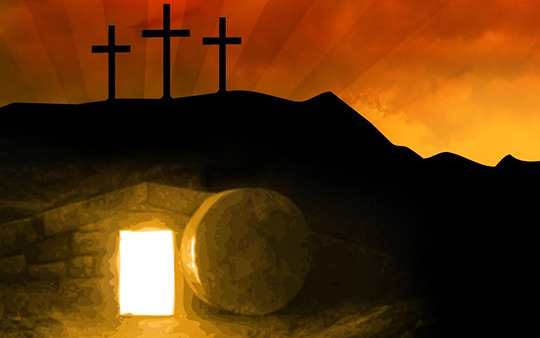
What
surely must have seemed a horribly conclusive defeat—death by Roman crucifixion, quickly
transformed into absolute triumph just three days later—victory over the grave.
As we enter into Holy Week, here are two short excerpts from In The Flesh – My Story that depict
these two powerful moments, all from the perspective of Jesus Himself. The
first is that agonizing moment the first nail pierced His sacred flesh for our sins.
The second is that glorious instant He resurrected from the dead to establish
everlasting life in His name.
Crucified:
With
preparations fully complete, they could now crucify me. A soldier pulled my
hand to the waiting hole and clutched it firmly in place by my wrist. Two others
held me down by my opposite arm. Another retrieved a mallet and a long iron
spike. My chest heaved in dreadful anticipation of his obvious task. And
although I held perfectly still, it was neither exhaustion nor the weight of
the soldiers that kept me in place.
Love.
Love
steadied me. My greatest expression of love for the world. Why would I resist?
This was not surrender. God’s commitment to humanity culminated now in this
ultimate act of self-giving.
I
felt the stinging stab of the nail gouging my sacred flesh as the soldier
pressed it into the very base of my palm, centered where hand met wrist. His
mallet raised. It seemed to hang in the air forever before rushing downward and
connecting with the large nail head. This single hammer smash propelled the
spike through my hand—driving through nerves, cartilage, carpal bones and into
the wood of the crossbeam. The iron sliced my wrist’s median nerve, roaring
pain up my entire arm, exploding into my brain. I choked on the air that gasped
and groaned from my lips. Three more pounds of the mallet shot waves of torment
through my whole body.
Resurrected:
There is
that moment at dawn when the sky burns vermilion, increasingly brighter,
awaiting the first stab of true light to fire over the horizon and across the
sky—that very instant when dawn becomes sunrise in a flash of vivid rays—day
breaking, conquering night.
At this
precise moment on Sunday morning, the greatest of all Sunday mornings, a light
far brighter than the awakening sun over the Mount of Olives radiated from
within my cave. As day broke across Jerusalem, a dazzling burst of brilliance
exploded from innumerable filamentary beams, shooting forth from every particle
of my lifeless body. For less than the blink of an eye, this pitch-black tomb
flashed brighter than the sun itself, eternal life rushing into my cadaver.
My eyes
opened to nothing but the burial cloth covering my face. My ears awoke to only
two sounds, one from this world and one from another. I heard the coarse
scraping of the stone opening the tomb’s entrance, as well as the grating
screech of Satan screaming in defeat.
I had
returned.
Read more at www.InTheFleshBook.com
February 7, 2018
This Lent, allow Jesus to explain what Holy Week was like.
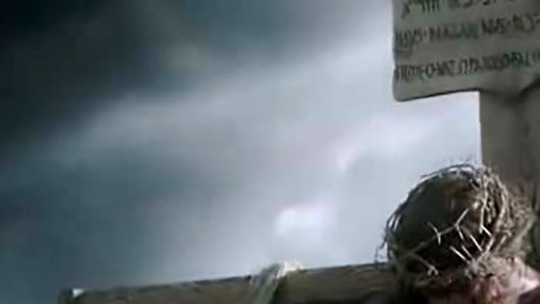
The most holy time of the year is
almost upon us—the time we remember what our Lord went through for our
salvation—how he overcame death to ensure everlasting life. We hold true to our
faith … that Jesus was crucified for our sins and rose from the dead. Many of
us have held strongly to these beliefs for so long, we almost take them for
granted. Over the years, we have grown so accustomed to these Gospel accounts, they
sometimes lose their full impact on us. Their significance slips. The stories no
longer seize our hearts like they once did.
And that’s a shame.
So how might we reinvigorate our emotion
(and devotion) toward Jesus’ death and resurrection? How can we gaze upon these
most pivotal events with new eyes?
Perhaps we can contemplate them through
HIS eyes! If we reflect a little each
day about Holy Week from our Holy
Savior’s point of view, we may gain a new perspective. We may experience a
deeper retelling. If we allow Jesus to describe in detail his own grueling steps
to Calvary, maybe our passion for Christ’s passion will be rekindled … perhaps
his walk from the grave will feel like our walk too.
December 6, 2017
Matthew, Mark, Luke and John: Correspondents, yes—Creative writers, no
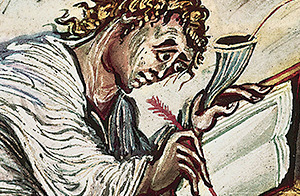
“Just the facts, ma’am.”
Many of us may remember that famous line Joe Friday always said in
Dragnet when gathering evidence. He didn’t want all the expanded details,
emotions, side stories or elaborate descriptions. He was on a mission to find
the truth … and nothing but the truth. All the fluff above and beyond the facts
impeded his quickest path to that goal.
The Gospel writers may have felt the same way. They were on a
mission to spread the ultimate truth, to get to the heart of the matter as holy
correspondents for Christ. They were compelled to “get the facts out”—the who,
what, where and how of Jesus’ life, death and resurrection. The Synoptic
Gospels, those by Matthew, Mark and Luke, truly focus on the hard-core intelligence
of this amazing life, summarily explaining what Jesus did, what he said, what
others said … and then moving on. John, who scripted the last of the Gospels,
may very well have read these other accounts, and having walked with Jesus
himself, chose instead to focus on other stories and events, allowing more
reflection in his prose, knowing that many of the “details” had already been
covered.
But for the most part, the Gospels simply provide us with the concise chronicles
and key teachings of Jesus—portraying everything He was, and is, in
clear, succinct, journalistic record … but with little to no elaboration. For
instance:
When they came to the place called The Skull, there they crucified Him.
– Luke 23:33
As a correspondent for Christ, Luke tells us what happened, but he
doesn’t dive into what that probably looked, sounded or felt like—the crowd,
the soldiers, the agony—the true horror of what “there they crucified Him” really
meant. The creativity is up to us! It is our
task to contemplate all that Jesus went through based on these accounts … to
close our eyes and ask, What was that
like, Lord? What kind of love could have sustained you through that for me?
November 17, 2017
Actually, not so controversial
How many
times have we heard, and probably even asked ourselves, “What would Jesus do?”
The question has become so ubiquitous, people readily recognize simply WWJD.
When we challenge
ourselves with “WWJD,” are we raising a controversial question? Is it blasphemous
to even ask, What would Jesus think?
Is it sacrilegious to try and enter the mindset of our Lord, to reflect on what
He might say or do in certain circumstances? Hardly! Jesus dwelt among us as a
model. The Word became flesh to set an example—to walk as a living precedent on
how to interact with others and build an intimate relationship with His Father.
In fact, the Gospels offer so many stories, or “case studies” if you will, about
Christ’s words and deeds, speculating what our Lord might say or do in other situations
becomes somewhat natural. Thus, WWJD is a meaningful hypothetical that can
strengthen our faith and enhance our relationships.
But how
about reflecting on what Jesus might have spoken, thought or even silently prayed
while he was physically here, truly present as a man? Might that be too controversial? Well, since the
Gospel narratives provide numerous accounts that develop spiritual perspectives
for His actions and dialogue, we are probably not too hard-pressed to consider what
the thoughts were behind those actions, what the meditations were behind those
words. If we take it a step further, if we flesh out such wonderful
contemplations with historical backstory and relevant, realistic human
discourse, an appreciation of the mindset of Jesus during his journey among humanity
becomes less and less of a stretch. It becomes a powerful, personal adventure
through the Gospels … an adventure to literally save the world. To behold the
life, death and resurrection of Jesus through His experience can help us better
understand our Savior and what He wants for us.
Controversial?
Give In
The Flesh – My Story a read before you decide.



